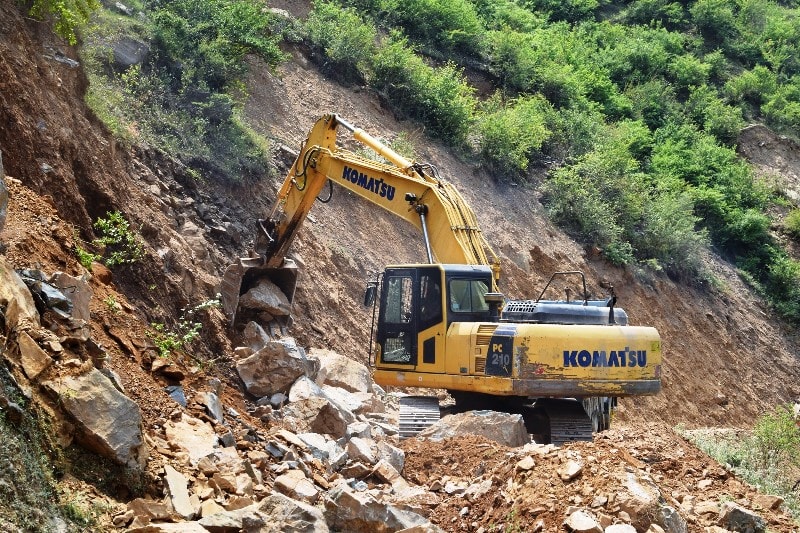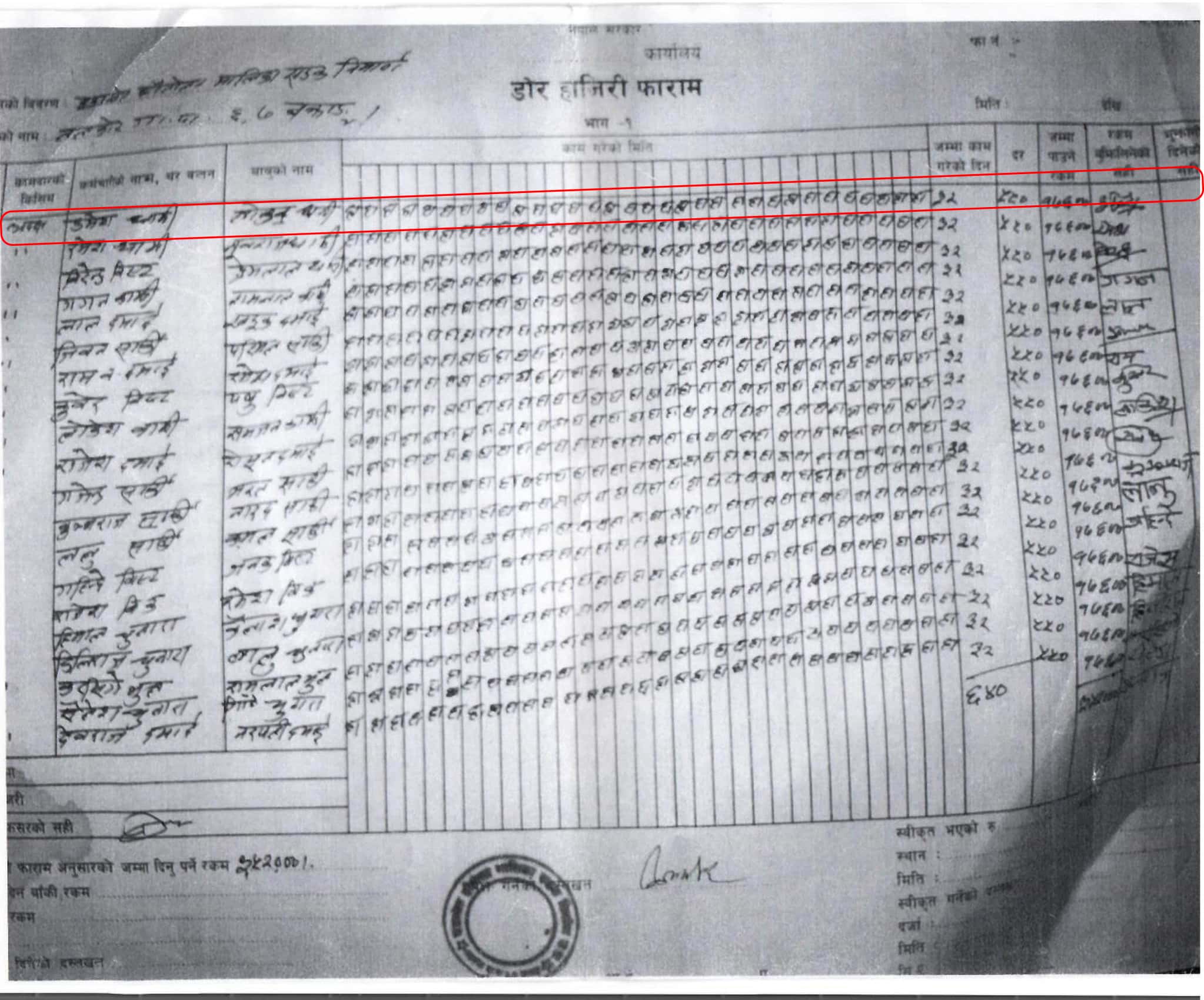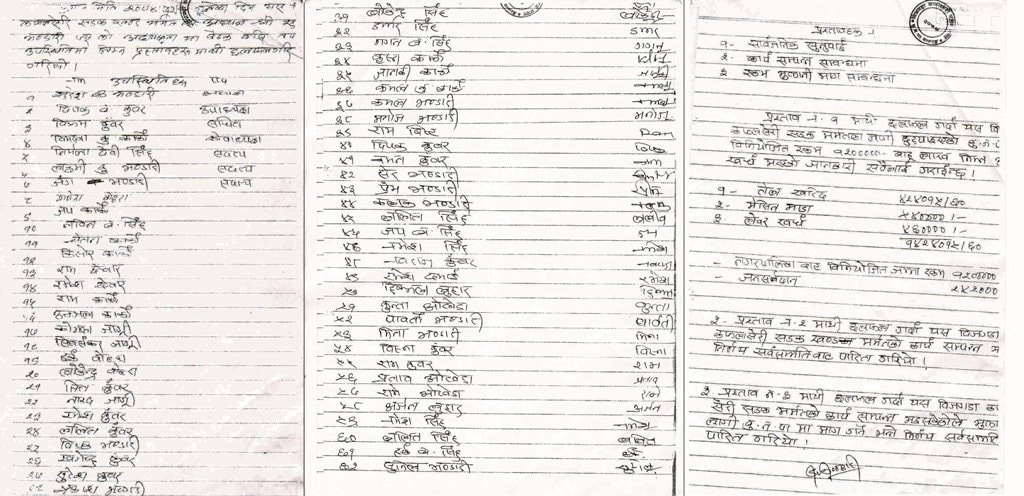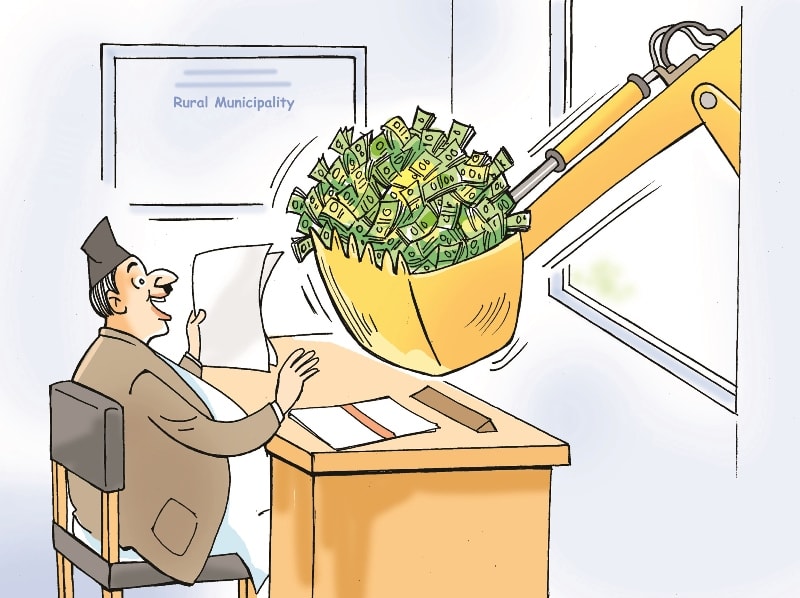Local authorities have stooped so low as to forging documents showing a one-year-old baby receiving a salary.
Bhuwan Bahadur Singh: Centre for Investigative Journalism-Nepal
Bajhang’s Talkot Rural Municipality’s decision to construct a road connecting Chadakhet-Malika-Dantola in the fiscal year 2017/18 led to the formation of a 13-member user committee led by Joggiri Bista.

The dozer used for the construction of the Dhamena-Dhungana road section in Bajhang’s Talkot Rural Municipality. Photos: Bhuwan Bahadur Singh
However, the construction of the road came under public scrutiny after they smelt a rat when it came to paying wages to the workers. A total of Rs 6.4 million was spent to complete the road.
Deciding to dredge up the issue as to how the committee spent such a huge amount to construct the road, we decided to obtain the documents by exercising the right to information.
Without much reluctance, the Talkot Rural Municipality provided us the required documents, including the design, estimate, committee minuting, report of completion of the construction work, field attendance form, among others.
The documents, however, left the entire village folks and the consumers flabbergasted. Reason? The record showed that some 362 people from Talkot rural municipality ward- 6 and 7 of the rural municipality had contributed their labor for 32 days to construct the road.
The record, particularly the field attendance, signed by the workers, showed that each worker had received a total of Rs 17,600 at the rate of Rs 550 per day, which were unrealistic and unusual.
Unconvinced with the figures as shown in the record, and suspecting the committee members’ intention, we decided to meet the concerned laborers of Lugata, Kotalgaon, Rajada, Dhamigaon, Betkhola, and Dantola villages of wards 6 and 7 individually and delve into the issue further. To our utter surprise, the claims mentioned in the documents turned out to be different from that of the villagers’ assertions.
Shyam Bahadur Bista, a local, was dumbfounded when he saw his name in the list of workers receiving Rs 17,600 as salary for 32 days of his work in the construction of the road.
“Did I ever go there to work?” a stunned Bista reacted, dubbing it as fake. “I am totally ignorant about this. I neither worked nor did I receive any salary from them.”
Kaile Chanara was another name to be listed in the workers’ attendance. Kaile’s neighbor, too, was flabbergasted to see Kaile’s name and signature on the document as it has been four years since Kaile has left the village.
Even more surprisingly, Debya Chanara has been mentioned as Kaile’s father, which is not true, according to Kaile’s neighbor and a ward member Dharma Chanara. “In fact, Devya Chanara is Kaile’s brother,” she said.
Peeking into the issue further, even ward member Dharma Chanara was found to have received Rs 17,600. Asked whether she had joined other workers, Dharma denied having gone there was a worker.
She was infuriated when she saw Dhaulya Chanara on the list mentioning him as her father.
“My father’s name is Gahindya Kami. Dhaulya is my son’s name,” she quipped adding, “Neither did I go there to work nor did I receive any money.”
She wondered who could forge people’s signature for the sake of money. “Yes, I went to the construction in the capacity of a ward member to monitor the progress, not as a worker. Moreover, I haven’t received a single penny,” she claimed.
That was not all. Several fake names and forged signatures were on the list during the course of the study. Hari Bahadur Dhami’s signature was forged identifying him as the son of Lal Bahadur Dhami in the field attendance sheet. However, no person with this name ever lived in the village, according to Ramesh Bista, a local.
Signatures of 27 people, including fake names Kishor Dhami, Pratap Dhami, have been forged in the field attendance sheet.
How did this happen? Says Ramesh Bista, “Nobody from this village worked as laborers in the road construction. Dozers were used to open the track. The committee members have used fake names and signatures to make money.”
Bista alleged user committee members for involvement in financial irregularities as the dozers do not usually take so many days to open the track. “They used dozers to open the track and forged documents to make money,” Bista said.
This trend, in fact, is a common practice in the hilly region of Sudurpaschim Province.
Chairperson of the user’s committee Joggiri Bista acquiesced of financial irregularities by forging names, signatures and other details. Bista, who has been the chairperson of the committee for two consecutive fiscal years, informed that so far a total of Rs 11.4 million has been spent.
Says Bista, “Yes, dozers were used to open the track. We prepared and submitted necessary documents at the rural municipality by including the names of husband and wife.”
Bista failed to mention the actual work progress of the road in the last two years by spending such a huge amount. “I cannot say outright how many kilometers the road has been constructed as of now. We need to measure it,” he said.
We then analyzed the documents related to the construction of the road from Maldanda-Masta-Kidanna constructed by the rural municipality surprisingly to find financial irregularities, forged names, signatures and documentation.

Fake attendance sheet submitted to the Talkot Rural Municipality as proof of labourers’ work on the Chhadakhet-Dantola-Malika road section. The document also mentions the name of Umesh Dhami, a one-year-old boy, as having worked and received payment.
Here, as many as 224 people–all fake names–had worked to construct the road at a daily wage of Rs 550 totaling to Rs 17,600 per month.
We set off for a mission to look for people (workers) in the village and to our utter surprise, no person with those names was found in the village. People with the names in the field attendance denied their participation in the construction work. They were shocked, while some were infuriated for forging their names and signatures. All documents turned out to be fake as this rural municipality–like Chadakhetm Malika, and Dantola, too, had applied the same method of making money.
So much so that even user committee members’ signatures were forged. Chanda Dhami, 53, a user committee member, cannot put signatures on the papers, yet documents show that she has signed on the field attendance to receive Rs 17,600 a month for her 32-day work.
Denying to have received a single penny from anywhere, Chanda said, “I have not received more than Rs 6 thousand as an allowance in the capacity of a ward member.”
Chanda said she would face any legal penalty if anyone proved her involvement in financial irregularities.
What is more interesting is that most of the names enlisted for receiving the salary are not in the village. For instance, a local Jogi Dhami, who has been staying in Bangalore of India for more than 15 years, has received the salary against the work.
Chetan Dhami of Talkot rural municipality is in India studying MBA for the last three years. Similarly, Lal Bahadur Dhami and Ramesh Dhami, who are in India for the last 10 years, and have never returned to their homes have received a salary from the rural municipality.
A local, Aafanta Bahadur Dhami expresses fury, “Why should they mention the names of my family members? They could keep the names of their family members if they want to make money through unfair means.”
Even more surprising is that a one-year-old son of Lokendra Dhami of Dhamigaon has not been spared. Umesh Dhami, a one-year-old baby, too, has received a salary. This is what the field attendance record shows.
According to the record, to everyone’s surprise, this one-year-old baby has put his signatures in the document while receiving a total of Rs 17,600 as salary as a worker to construct the Maldanda Kidanna road.
Talkot Rural Municipality, so far, has spent Rs 11.5 million in the last three fiscal years for the construction of the road.
Deva Raj Dhami, the Chairman of the local road construction committee who played in the allocation and utilization of the budget initially tried to skip the fact.
“It can’t be. How did you get it?” he queried us back.
When we clarified to him about the documents and other details that we had obtained, and the verification from the concerned people, he stepped back.
“In the first few cases we did so, because we, as a novice, wanted to maintain the record through individual’s verified attendance, now it has stopped,” Dhami spoke in a calm tone this time, “We have kept the record of the dozer’s bill as well.”
According to our study, in all the roads constructed by Talkot Rural Municipality, the authorities were found to have been making money in the name of the payments for the workers even though the task was done by dozers. In the last three consecutive financial years, the rural municipality has spent Rs 70 million to construct 10 roads.
According to Mayor Lal Bahadur Bista, the length of the road is some 55-60 kilometers.
Initially, mayor Bista also ruled out making payments by forging signatures or by creating fake workers.
He claimed to have maintained the individual record during the gabion filling and fence building and the dozer bill in the second phase. However, he could not sustain his lie for too long. Later, he changed his voice.
Upon informing him about the documents and the evidence that we had obtained, he tried to put all blame on the engineer and the chief administrative officer of the municipality.
“If that is due to some legal constraints, you better ask the engineer and chief administrative officer,” Mayor Bista said adding, “If someone has done it clandestinely, I have not much idea.”
Even hearing was fake
We then shifted our study to another municipality lying in the southern part of the district. To everyone’s surprise, there, in the Bungal Municipality, not only the field attendance but also the public hearings mentioned in the record were fake. The officials had made the payment on the basis of fake bills and fake documents based on fake public hearing.

Document with a forged signature, purportedly taken during the fake public hearing of the Bijgada-Kafalseri road section, submitted at the Bungal Municipality. Many who are said to have attended the so-called hearing do not remember when such a hearing took place.
Our team found the condition of the Bungal Municipality even worse than Talkot. The attendance of the workers and the public hearing said to have conducted at the field both were fake. The officials had written the name of the people who were not there and forged their signatures.
The document mentioning the names of the participants in the public hearing conducted by the local users’ committee has the signature Jaya Bahadur Singh of Bungal-8, Jhapa. However, Singh is unaware of the project and the occurrence of such a hearing.
When the copy of the public hearing conducted there was shown to the public, Singh along with other people were take aback.
“We have absolutely no idea about the project. We are also not aware of any public hearings here,” Singh said. He added that not only his, other signatures in the document were also fake.
Nava Raj Kunwar, another ‘signatory’ in the public hearing’s document was also taken aback at the news that a project was executed and he had attended the public hearing conducted there.
“When I am ignorant about the project and the users’ committee, how do I know about the public hearings,” Kunwar asked, adding, “This is not my signature. There has been no public hearing at all. All documents are fake.”
Dhan Bahadur Bista, the Mayor of Bungal Municipality, who claimed to have constructed 14 different roads at the cost of Rs140 million, however, expressed ignorance about the fraud.
“I do not know what the technicians have done. What the technicians did and how the Ward office recommended it can better be briefed by them,” Bista told us.
He claimed that he was repeatedly asking all people to work sincerely but had never been skeptic of the documents presented to him before.
“I have been telling people to work sincerely. Trusting them, I never cross-checked the documents,” the Mayor said. “Rather, we have set the upper limit for the dozer.”
According to him, everyone had to abide by the upper limit for the dozers. “We have set Rs 4000/hr as the rate for a dozer, in some places they have paid Rs 6,000 to Rs 7,000 per hour; whoever commits error will be sued.”
Fraud for commission
Irregularities were found in rural municipalities, including Talkot, Surma, Mashta, Khaptadchhanna, Bitthadchir and Durga and Bungal Municipality where we conducted out the study.
“I did the field attendance of the workers myself,” one of the dozer owners told us. “I, with the help of the consumer’s committee, prepared the field attendance as per the user committee’s expectation.”
“People’s representatives, at the time of allocating the project tell us, ‘we expect this much commission from you, you prepare documents as required’ we have to allocate money to them as well,” he revealed another reason for making the payment on the basis of fake attendance. “We have spent millions on dozers and other heavy equipment, we want to work at any cost.”
He further revealed that in the Rs 5 million project, they (the dozer owners) have to allocate up to Rs 1.5 million to the consumer’s committee and rural municipality officials. “We get the payment as per our work, rest goes for the documentation and approval authorities,” he said.
After hearing from the dozer owner connected with the construction activities taking place in more than 5 local levels of Bajhang, we started collecting additional details about the fraud and forgery.
We spoke to representatives of various user committees, and also studied the documents such as the report of the Auditor-General and the policies and programs of local levels. The study of the documents established the fact that the users’ committee and the people’s representatives were involved in an organized way to make forge
Examples abound
Khaptad Chhanna Rural Municipality formed a consumers’ committee for the construction of Godraya Gorkhali Jharna tourism road in the FY 2018/19. Harka Chauhan was appointed the users’ committee chairperson. Tilak Khadka, the ward chairperson of Ward No. 6 got his dozer selected for this Rs 3 million project.
 Interestingly, the committee, which had the authority to procure the construction materials or the construction service itself did not take part in the deals related to the dozer’s rate. Neither did it talk to the owner of the dozers. The mandatory regulations that the contract allocation should be done on the basis of a sealed tender form received from at least three service providers willing to work as per the conditions set by the assigning party were overlooked.
Interestingly, the committee, which had the authority to procure the construction materials or the construction service itself did not take part in the deals related to the dozer’s rate. Neither did it talk to the owner of the dozers. The mandatory regulations that the contract allocation should be done on the basis of a sealed tender form received from at least three service providers willing to work as per the conditions set by the assigning party were overlooked.
“The mayor told us that the rural municipality has decided to use Tilak Khadka’s dozer; the rate is Rs 6,500 per hour, we should do accordingly,” Chauhan, the committee chairperson, said quoting the Mayor, “We have done accordingly. We just monitored whether it was on the road or not, the dozer rate was fixed by the municipality itself.”
Chauhan made it clear that although the dozer had done the work, the municipality asked the committee to help the authority by arranging for the field attendance, that’s why out of Rs 3 million projects the documents were prepared to show that worth Rs 2.5 million was done manually and worth Rs 500 thousand tasks of cutting the rocky areas was done by the dozer. He said that 200 people’s fake signatures were arranged for the same.
“Just to make it reliable and convince the regulating authority that dozer was used only for rocky parts, we submitted the bill worth Rs 500 thousand for the dozer and the required diesel,” Chauhan said.
“We had got some dozer owners who promised to work at the rate of Rs 5,000/hr,” Mangal Bahadur Khadka, the General Secretary of the users’ committee said adding, “As the rural municipality had already decided to use the ward chairperson’s dozer, we could not go against it.”
In all construction works in the Khaptad Chhanna Rural Municipality, Ward Chairperson Khadka’s dozer is used. Khadka does the transaction of dozer business under the name of his elder brother Darshan Khadka.
According to Chairman Barka Bahadur Rokaya of Khaptad, the rural municipality has constructed 7 roads worth Rs 40 million from the fiscal year 1917/18 to 1919/20. Yet, he tried to convince that the municipality has not made any decision saying a particular person’s dozer only should be used.
“The rural municipality has not made any decision saying that only ward chairperson Khadka’s dozer should be used,” Mayor Rokaya tried to clarify it. “However, we felt that using a local dozer would be more convenient than bringing it from other places so Khadka’s dozer is used.”
However, he also used his ignorance about the payment made under the name of workers although the task was done by the dozer. “I don’t know how the engineers did it,” the mayor said, expressing ignorance about the corruption and fake documents.
When we went on investigating the prospective abuses and wrongdoings in the road construction in rural areas, we found alarming irregularities in the Surma rural municipality as well. It was found that this municipality made the payment worth Rs 5 million without monitoring whether the construction work was really done or not. Thus, without looking at the work progress, the municipality made such a huge payment in the fiscal year 2017/18.
In many bills and vouchers of the Rs 10.7 million Dhanidhara –Dhaula- Bichhada road project, there is no official stamp (seal) of the technicians, authorities, and the representatives of the consumer’s committee.
The report of the Auditor General says, “Provided the payment of Rs 5 million is found to have been made without proper documents and verification, the principal amount should be retained from the authority that makes the payment.”
The documents show that the rural municipality has made the payment worth Rs 8.87 million to Surma Sarovar Service and Prabhu Construction for their dozer used to clear and cut the mud on the road area. This payment is made without formal documents and only on the basis of handbills and hand vouchers.
Interestingly enough, out of Rs 8.8 million provided for dozer service, the documents have mentioned Rs 4.74 million as dozer rental charge and Rs 4.88 million for diesel.
“It’s evident that there has been a financial irregularity,” engineer Deepak Bohara, who has an experience of working in various local levels of Bajhang district, said, “When and where the vehicle’s rental cost is surpassed by the fuel cost, there is, obviously, irregularity and corruption.”
According to engineer Bohara, if calculated from the dozer’s rent, the fuel cost can go only up to Rs 1 million.
The Auditor General’s report 2017/18 has also expressed its skepticism towards this issue.
“As the excavator charge and the fuel cost is shown somehow similar, it should be judged as per the norms and provided payment seems more concerned the party should be made to pay for it,” the report says.
The Auditor General’s report has also pointed out the irregularities in the construction of other roads.
The report has revealed that in the Jak Pangarjadi road construction, Rs 3.37 million has been paid without checking that the gabion wall worth Rs 1.71 million was not constructed at all. In this section, a dozer has been used to widen the structure.
The financial experts observe that not only in Surma, Talkot and Bungal, but irregularities are also common in most of the local levels and their projects.
“Even 60 percent of what’s shown in the document as complete has not been done so far,” engineer Bohara said. “Provided the verification is sought at the local levels, all the irregularities will be noticed,” he added.
According to the Public Procurement Regulations, heavy equipment cannot be used for any work done under the user’s committee.
“In any construction activities carried out under the user’s group or beneficiary communities, loader, excavator, roller, dozer, bitumen distributor, bitumen boiler, heavy machines, etc cannot be used,” according to the Clause 97 (9) of the Regulations.
One of the entrepreneurs familiar with such irregularities stated that such unlawful activities are held beneficial by both the people’s representatives and the dozer owners. “The user’s group or committees can take pride in the quantity of the work rather than the quality, the entrepreneurs need not pay the tax in the income and the people’s representatives get a chance to earn a lot in commission,” he explained.
(With inputs from Ashish Bahadur Singh)



